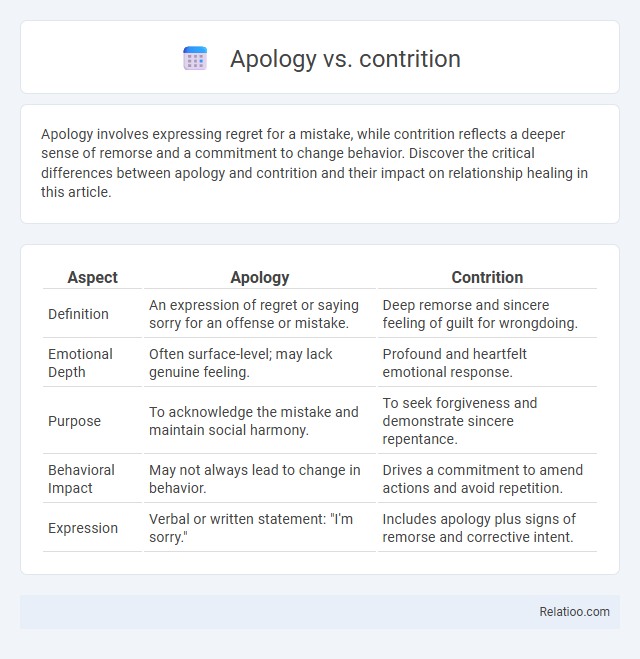Apology involves expressing regret for a mistake, while contrition reflects a deeper sense of remorse and a commitment to change behavior. Discover the critical differences between apology and contrition and their impact on relationship healing in this article.
Table of Comparison
| Aspect | Apology | Contrition |
|---|---|---|
| Definition | An expression of regret or saying sorry for an offense or mistake. | Deep remorse and sincere feeling of guilt for wrongdoing. |
| Emotional Depth | Often surface-level; may lack genuine feeling. | Profound and heartfelt emotional response. |
| Purpose | To acknowledge the mistake and maintain social harmony. | To seek forgiveness and demonstrate sincere repentance. |
| Behavioral Impact | May not always lead to change in behavior. | Drives a commitment to amend actions and avoid repetition. |
| Expression | Verbal or written statement: "I'm sorry." | Includes apology plus signs of remorse and corrective intent. |
Understanding Apology vs Contrition
Understanding the difference between apology and contrition is essential for genuine reconciliation; an apology expresses regret for an action, often acknowledging a mistake or offense, while contrition conveys a deeper sense of remorse and a heartfelt commitment to change. Your sincere apology may open communication, but true contrition involves emotional acknowledgment and a desire to make amends beyond mere words. Recognizing these distinctions helps you navigate social and personal conflicts with empathy and integrity, fostering trust and healing in relationships.
Definitions: Apology and Contrition Explained
Apology refers to expressing regret for a mistake or offense, often as a social or formal acknowledgment of wrongdoing. Contrition involves deep remorse and sincere repentance for hurting someone, emphasizing internal guilt rather than just verbal acknowledgment. Understanding the difference helps you communicate remorse effectively by choosing either a straightforward apology or a heartfelt contrition based on the situation's emotional context.
Key Differences Between Apology and Contrition
Apology involves expressing regret for a wrongdoing, often to acknowledge fault and seek forgiveness, while contrition signifies a deeper, heartfelt remorse accompanied by genuine repentance and a desire to change. An apology may be superficial or routine, whereas contrition reflects an emotional transformation and moral recognition of the impact of one's actions. The key difference lies in the sincerity and internal acknowledgment, with contrition going beyond words to include true remorse and commitment to amend behavior.
The Role of Intent in Apology and Contrition
Apology and contrition both involve acknowledging wrongdoing, but intent distinguishes their impact profoundly. Apology focuses on expressing regret and may be viewed as a social gesture, while contrition requires genuine remorse and a sincere commitment to change, reflecting true intent. Your sincere contrition signals a deeper moral acknowledgment, making it more effective in restoring trust and healing relationships.
Emotional Depth: Contrition vs Surface-Level Apology
Contrition embodies profound emotional depth, reflecting genuine remorse and an internalized recognition of wrongdoing, often motivating sincere behavioral change. In contrast, an apology may remain at the surface level, functioning as a social gesture without necessarily conveying true regret or personal accountability. This distinction underscores the importance of contrition in fostering authentic reconciliation and emotional healing beyond the mere utterance of words.
Social and Cultural Perceptions
Apology often serves as a social ritual that acknowledges wrongdoing and aims to restore relationships by expressing regret, while contrition conveys deeper personal remorse rooted in moral or spiritual reflection and is perceived as more sincere in many cultures. Social perceptions tend to view apologies as necessary but sometimes superficial, whereas contrition is valued for demonstrating genuine internal change and responsibility. Cultural attitudes toward these expressions vary, with some societies emphasizing formal apology ceremonies and others prioritizing contrition's role in personal and communal healing.
Effective Communication of Regret
Apology involves explicitly expressing regret for a specific action, aiming to acknowledge fault and repair relationships. Contrition goes deeper by reflecting genuine remorse and a heartfelt desire to make amends, often involving personal accountability and emotional sincerity. Effective communication of regret combines clear apologies with authentic contrition to foster trust, demonstrate empathy, and promote reconciliation.
Psychological Impact on the Offender and Recipient
Apology involves acknowledging wrongdoing and expressing regret, which can lead to relief and emotional repair for both offender and recipient by validating feelings and promoting empathy. Contrition goes deeper, reflecting genuine remorse and a commitment to change, which significantly reduces offender's guilt and fosters recipient's trust and healing. While both responses influence psychological recovery, contrition typically produces a stronger impact on forgiveness and long-term relational restoration.
When Is Contrition Necessary Over Apology?
Contrition is necessary over apology when genuine remorse and a heartfelt commitment to change are required to restore trust and moral integrity. Unlike a simple apology, contrition involves a deeper emotional acknowledgment of wrongdoing and an active desire to make amends. Your choice to express contrition signals sincerity and a willingness to fully address the harm caused, which is essential in situations demanding reconciliation and personal growth.
Apology and Contrition in Conflict Resolution
Apology and contrition play distinct yet complementary roles in conflict resolution, with apology serving as the explicit acknowledgment of wrongdoing that facilitates communication and reconciliation. Contrition reflects a deeper emotional remorse and genuine regret, signaling a true commitment to change and repair the harm caused. Effective conflict resolution hinges on integrating both an honest apology and sincere contrition to rebuild trust and promote lasting peace.

Infographic: Apology vs Contrition
 relatioo.com
relatioo.com